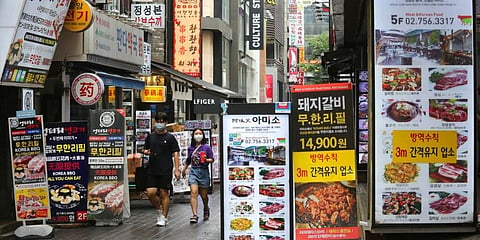COVID-19: South Korea reports 371 new infections, health workers scramble to contain local transmissions
SEOUL: South Korea is tightening social distancing restrictions in the greater capital area, requiring restaurants to provide only deliveries and takeouts after 9 pm and shutting down gyms and after-school academies.
Health Minister Park Neung-hoo announced the steps Friday after 371 new infections of COVID-19, the 15th straight day of triple-digit jumps that brought national totals to 19,077 cases, including 316 deaths.
The measures, imposed for eight days starting Sunday, will require restaurants and bakeries to provide only delivery and takeout meals from 9 pm to 5 am and enforce mask wearing, distance between tables as well as keep customer lists when they do accommodate diners.
Franchised coffee shops, such as Starbucks, can provide only takeout drinks and food. Indoor sports facilities such as fitness gyms and billiard halls will be shut while after-school academies will only be allowed to provide remote learning. Visitors will be banned from nursing homes.
Park said more than 470,000 businesses in the Seoul area will be affected by the measures, which he described as the “last stand” before lockdown steps.
“I once again plead to the people of our country -- for yourself and for us, please remain in the safe space that is your home,” Park said in a nationally televised news conference. “Avoid contacting other people.”
Most of the new cases came from the Seoul area, bumping the region’s caseload to 7,200 and overtaking the southeastern city of Daegu, the epicentre of a massive outbreak in late February and March that was stabilized by April.
Health workers have found it more difficult to contain the recent transmissions centred around the more populated capital area, where clusters have been tied to churches, restaurants and schools. The country has added more than 4,300 to its caseload over the past 15 days, prompting concerns about overwhelming hospitals.
Korea Centers for Disease Control Director Jeong Eun-kyeong said predictions based on models suggest the country could possibly see daily jumps of around 800 or even 2,000 as early as next week if it fails to slow the viral spread.
While the government has recently banned large gatherings and shut down nightspots and churches nationwide, there have been calls for elevating social distancing measures to the highest level. Such measures, designed to allow for only essential social and economic activities, would possibly prohibit gatherings of more than 10 and advise private companies to have employees work from home.
But Park and other officials said the government wasn’t ready to implement “Level 3” restrictions yet, saying they would inflict serious harm on the economy that policymakers say will likely shrink for the first time in 22 years.
“Level 3 restrictions will affect a much broader range of businesses and facilities than the measures we just announced and leave deep scars on the economy, livelihoods and daily life,” Park said.

